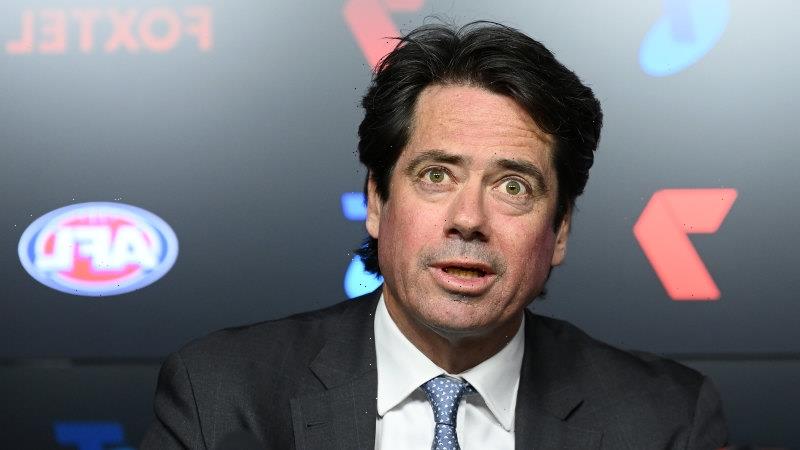The federal communications minister and the opposition have both criticised Australia’s broadcast rights laws as outdated, a day after the AFL announced a record $4.5 billion, seven-year TV rights deal from 2025.
The landmark deal will earn the league $642 million annually and while the number of free to air games broadcast, currently set at about three and a half games per round, will not change the scheduling will.
AFL CEO Gillon McLachlan has signed the biggest broadcasting deal in Australian sporting history.Credit:Getty Images
Under the deal, Seven and Seven digital will have Thursday night games for the first 15 weeks of the season, while Foxtel has secured eight “super Saturdays” in which all games will be on the Pay TV network and its Kayo streaming platform.
The AFL Fans’ Association said the new broadcast deal would be tough on supporters and that fans should have been better rewarded for their strong support of the code during the COVID-19 pandemic.
Ahead of the deal being finalised, communications minister Michelle Rowland intervened in the bidding process to remind the AFL to keep live matches on free-to-air television, which is a requirement under anti-siphoning legislation that keeps culturally significant events on free to air television.
Rowland has brought forward a review of the anti-siphoning laws, which were introduced in 1992 as Rupert Murdoch launched pay TV company Foxtel to ensure the public could watch major sporting and cultural events for free.
The review will be conducted by her department and which will, she said, “give all Australians the chance to enjoy live and free events of national and cultural significance”.
“The Coalition had almost a decade to ensure this legislation was fit for purpose. They dropped the ball, and Labor has made it a priority,” she said.
“Our media laws must encourage innovation without locking iconic sports behind a paywall and leaving some Australians behind.”
She said the review would be completed before April next year.
Opposition communications spokeswoman Sarah Henderson agreed Australia’s anti-siphoning laws were no longer fit for purpose, as they could stop major Australian sports and cultural events from being broadcast by pay TV operators but not global digital or streaming platforms such as Facebook, Amazon Prime, Google and Netflix.
“Rather than conduct another review, Labor’s communications minister must act immediately to fix this loophole and update Australia’s anti-siphoning laws. On 24 August 2022, knowing the AFL deal was imminent, Michelle Rowland committed only to release a discussion paper ‘in the coming weeks’ but where is it? This Labor government has been caught asleep at the wheel,” she said.
“There is certainly an argument that additional restrictions are required such as guaranteeing a minimum number of free-to-air games and ensuring that prime days on which events are held are not excluded.”
The AFL Fans’ Association spokesman Ross Issko said supporters will face significant changes to their habits that could be tough because “not everybody has pay TV, it will take time for them [AFL fans] to get used to it”.
Marquee matches such as Anzac Day at the MCG, and the Easter Monday and Queen’s Birthday matches will remain on Seven.
“No free-to-air games for the first eight weeks on Saturday barring the marquee games? All fans will be disappointed with that,” said Issko.
“During COVID, fans helped to keep the clubs afloat, taking something away from fans doesn’t seem to be a way to say ‘thank you’.”
AFL boss Gillon McLachlan justified the increase in Thursday night matches by pointing to research that showed the time was increasingly popular with fans. However, the AFLFA said that matches in that mid-week timeslot don’t suit every fan.
“For the people that love watching Thursday night footy on TV, it’s great, but for people who like going to the footy, especially the kids, that’s tough,” Issko said. “Don’t take fans for granted.”
Channel Ten and its owner Paramount put forward a bid of $6 billion over 10 years for the rights while Nine Entertainment Co, owner of this masthead, also put forward a bid.
Cut through the noise of federal politics with news, views and expert analysis from Jacqueline Maley. Subscribers can sign up to our weekly Inside Politics newsletter here.
Most Viewed in Politics
From our partners
Source: Read Full Article

